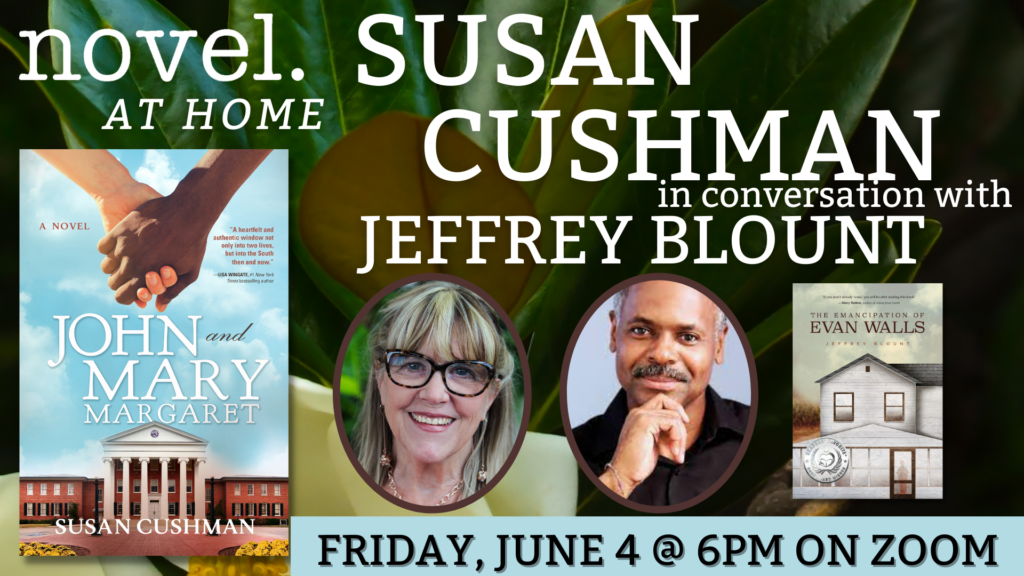Writing From Each Side of the Color Line
My new novel JOHN AND MARY MARGARET releases this Tuesday, June 8! I’ve already had about seven interviews (see all the press for the book so far HERE) and a few reviews, and I’ve actually been surprised at how few people have asked me the question I was most expecting: “How do you feel about you—as a White female—writing about a Black male, who is one of the protagonists in John and Mary Margaret?” Or even, “What gives you the authority to assume that voice?”

When Black author (and former director at NBC News) Jeffrey Blount and I were preparing to be “in conversation” for the virtual launch of John and Mary Margaret this past Friday night (hosted by Novel Memphis – you can watch a video of the dialogue here), we discussed this topic, and Jeffrey shared an article from the Wall Street Journal (January 29, 2021) that was helpful. “James Baldwin’s ‘Cultural Appropriation,’ and Mine” by Scottish writer James Campbell tells why Black authors like James Baldwin and Toni Morrison feel it’s important for White authors to write about Blacks.
Before I continue, I thought I’d share a definition of “cultural appropriation.” I think this one is good:
Cultural appropriation is the adoption of an element or elements of one culture or identity by members of another culture or identity. This can be controversial when members of a dominant culture appropriate from minority cultures. (Wikipedia)
“Crossing the divide and reporting back . . . .”
As Campbell says in the article:
Writers on each side of the color line have more than just the right to cross the divide and report back. It is their duty. Imaginative life depends on cultural exchange. Literature depends on the imagination. To put it another way: Culture is cultural appropriation. Any artist worth the name should be willing to take a punch for it.
In his 1967 novel, The Confessions of Nat Turner, William Styron, a white southerner, told the story of America’s bloodiest slave revolt—in the voice of its African-American leader. Campbell writes about Toni Morrison’s response to the criticism Styron received:
Asked by the Paris Review if Styron had “the right” to take Nat Turner as a subject, Morrison replied: “Of course he does. He has the right to write about whatever he wants. To suggest otherwise is outrageous.”
Joining Voices Across the color Divide: Baldwin, Welty, King, and Faulkner
John and Mary Margaret is peppered with quotes by two important Mississippi authors—Eudora Welty (who makes a cameo appearance in the novel) and William Faulkner—and also important individuals in the civil rights movement, like James Baldwin and Martin Luther King, Jr. I’ll close with quotes by all four of them that are included in John and Mary Margaret.
The challenge to writers today, I think, is not to disown any part of our heritage. Whatever our theme in writing it is old and tried. Whatever our place, it has been visited by the stranger, it will never be new again. It is only the vision that can be new; but that is enough. —Eudora Welty
Not everything that is faced can be changed, but nothing can be changed until it is faced.—James Baldwin, The Cross of Redemption: Uncollected Writings
Never be afraid to raise your voice for honesty and truth and compassion against injustice and lying and greed. If people all over the world…would do this, it would change the earth.—William Faulkner
I refuse to accept the view that mankind is so tragically bound to the starless midnight of racism and war that the bright daybreak of peace and brotherhood can never become a reality… I believe that unarmed truth and unconditional love will have the final word.—Martin Luther King, Jr.

Congratulations on the book launch! I agree that authors have to be able to write in the voice of someone who is different from them. Otherwise, there would be no stories like John and Mary Margaret’s able to be told, as no one can be simultaneously white and black and male and female.
Thanks, Joanne. My education about race is definitely a work-in-progress.